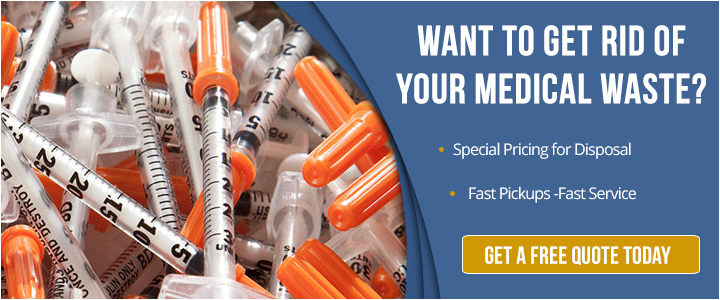In California, you typically have two options available to you for medical waste disposal … a drop-off site or disposal company that comes to you and removes the waste from your facility.
No matter which method you choose, if your facility generates medical waste, you are responsible for managing all aspects of that waste. That includes from the moment it is generated to its final disposal.
However, knowing where to dispose of medical waste can be complicated considering some medical waste is hazardous and some is non-hazardous.
Making a mistake in how you dispose of your medical waste can put you in jeopardy of violating the Resource Conservation and Recovery Act (RCRA) and California state environmental laws, resulting in potential fines and penalties.
Here are some of the advantages and disadvantages of each disposal method to help you determine which option is better for your company so that you can ensure all regulatory laws are met.
Medical Waste Drop-Off Sites
Drop-off facilities are designed to make medical waste disposal easy. In California, there are several sites available for different types of medical waste, from sharps needles to pharmaceutical medications.
easy. In California, there are several sites available for different types of medical waste, from sharps needles to pharmaceutical medications.
Advantages Of Medical Waste Drop-Off Sites:
The biggest advantage of a medical waste drop-off site is convenience. CalRecycle offers resources on its website that can help you find a drop-off location. However, most of these locations only accept items like sharps and medications.
Individual counties may offer drop-off services as well. Los Angeles County, for example, publicizes several collection events and collection points on its Public Works department page.
Drop-off sites can be a great choice for companies that generate small amounts of regulated medical waste that fall within the parameters of what these locations accept. However, before heading to a collection site, double check that it can accept waste generated from a business, since some may only accept waste generated in the residential sector.
Disadvantages Of Medical Waste Drop-Off Sites:
The amount of waste and type of waste you generate is likely the greatest disadvantage of a medical waste drop-off site. Most facilities cannot accept large amounts of infectious waste. That can be an issue for many healthcare or laboratory settings.
Consider this: Just one staffed bed in a U.S. hospital can produce nearly 33 pounds of medical waste every day. It should come as no surprise then that U.S. hospitals produce millions of tons of medical waste per year. In fact, one University of Maryland study estimates nearly 5,000 hospitals in the U.S. produce more than 7,000 tons of medical waste each day.
Take into account other types of healthcare facilities such as veterinary, dental, home health care and pharmacy, and the amount of medical waste produced becomes staggering.
Then there’s the issue of the type of waste you generate. If you’re a medical, pharmaceutical or laboratory facility, chances are you generate several different types of medical waste. Because many drop-off sites only accept particular types of waste, you may find yourself transporting your medical waste to several different drop-off sites.
For example, if your medical waste stream includes sharps, unused pharmaceuticals, plastic containers, glass bottles, biomedical waste and fluorescent lights, this could result in six different locations for drop-off.
You will also need to be familiar with the proper disposal methods for each type of medical waste that your facility generates. This is critical to ensuring that you meet all healthcare waste disposal guidelines. While some waste can be taken to drop-off facilities, other waste, such as some types of hazardous waste cannot.
Disposal Companies That Pick Waste Up
Disposing of your medical waste doesn’t have to involve you leaving your facility. An experienced hazardous waste disposal company can come to you, take all of your medical waste at once and dispose of it at the appropriate facility.
leaving your facility. An experienced hazardous waste disposal company can come to you, take all of your medical waste at once and dispose of it at the appropriate facility.
Advantages Of Medical Waste Disposal Companies:
Like drop-off sites, this method of medical waste disposal offers convenience, especially for companies that generate significant amounts of medical waste.
Hazardous waste disposal companies, in particular, can handle the type of waste that cannot be dropped off at waste sites. They also will:
- Ensure they find a facility that will accept your particular type of waste
- Stay on top of changing industry conditions and regulations
- Identify any unknown wastes using sampling and testing methods
- Provide scheduled pickups, which can be beneficial if you regularly generate high volumes of waste that need to be removed
- Transport the waste, which can save you any associated manpower and transportation costs
- Ensure all your containers are properly labeled
One final important advantage of using a waste disposal company experienced in medical waste is the ability of the disposal company to ensure you meet all cradle to grave regulations.
Hazardous waste generators are responsible for following cradle to grave requirements, which state that you are responsible for managing all aspects of your waste from the moment it is generated to its final disposal.
Transporting your facility’s medical waste yourself can have serious ramifications if an accident occurs on the way to a drop-off site or if an employee you have entrusted it with improperly disposes of it. This puts you in direct violation of the Resource Conservation and Recovery Act, and can result in substantial fines and penalties.
Disadvantages Of Medical Waste Disposal Companies:
The only disadvantage of hiring a medical waste disposal company versus dropping off medical waste yourself is the associated costs. If your company rarely generates medical waste, and when it does, it’s the type of waste that can be easily dropped off at a facility, it may not be worth the cost of hiring a medical waste disposal company.
versus dropping off medical waste yourself is the associated costs. If your company rarely generates medical waste, and when it does, it’s the type of waste that can be easily dropped off at a facility, it may not be worth the cost of hiring a medical waste disposal company.
However, keep in mind that the cost of an improper disposal or cradle to grave violation can be far more costly in the end.
Where To Find A Disposal Company
If a disposal company is the right choice for your business, it’s important to choose a partner you can trust.
Make sure you check out the Department of Toxic Substances Control Registered Hazardous Waste Transporter Database to make sure the company you are considering working with is a legally registered transportation business.
It’s also important to make sure the company will transport your waste to the appropriate site if your waste requires treatment before it can be disposed of in a landfill. There are several treatment technologies that sterilize medical waste before it is disposed of, making it less hazardous. This helps to ensure that infectious or hazardous materials do not seep into nearby soils or waterways.
You can read more about these treatments in our article, Medical Waste Disposal Methods.
Experience is key, so don’t be afraid to ask for references. Remember, different types of hazardous waste require very specific disposal methods. Even the same type of waste may require different disposal methods depending on the quantity.
That’s why it’s essential to work with a trusted and experienced medical waste disposal provider to ensure your waste streams are disposed of legally and safely.


Comment